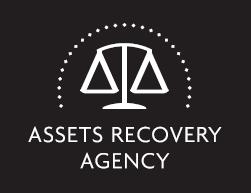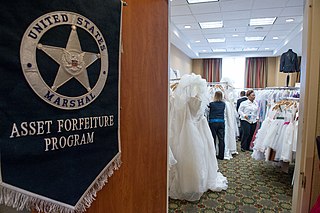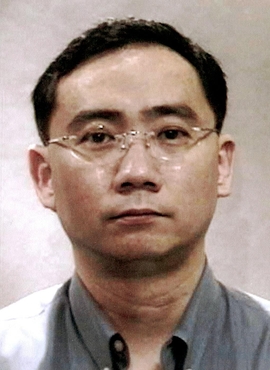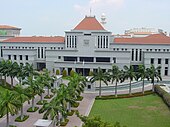
The Assets Recovery Agency (ARA) was a non-ministerial government department in the United Kingdom. It was established under the Proceeds of Crime Act 2002 (POCA) to reduce crime by confiscating the proceeds of any crime. It was granted a new power of civil recovery through the High Court, and could also take over the powers of the HM Revenue and Customs (HMRC) to levy tax without identifying a source for taxed income.

The Criminal Assets Bureau (CAB) is a law enforcement agency in Ireland. The CAB was established with powers to focus on the illegally acquired assets of criminals involved in serious crime. The aims of the CAB are to identify the criminally acquired assets of persons and to take the appropriate action to deny such people these assets. This action is taken particularly through the application of the Proceeds of Crime Act 1996. The CAB was established as a body corporate with perpetual succession in 1996 and is founded on the multi-agency concept, drawing together law enforcement officers, tax officials, social welfare officials as well as other specialist officers including legal officers, forensic analysts and financial analysts. This multi-agency concept is regarded by some as the model for other European jurisdictions.

The Proceeds of Crime Act 2002 (POCA) is an act of the Parliament of the United Kingdom which provides for the confiscation or civil recovery of the proceeds from crime and contains the principal money laundering legislation in the UK.
Preventive detention is an imprisonment that is putatively justified for non-punitive purposes, most often to prevent further criminal acts.

The Central Narcotics Bureau (中央肃毒局) or CNB is a department under the Ministry of Home Affairs (MHA) tasked to combat drug trafficking and distribution and is responsible for coordinating all matters pertaining to drug eradication in Singapore.

Asset forfeiture or asset seizure is a form of confiscation of assets by the authorities. In the United States, it is a type of criminal-justice financial obligation. It typically applies to the alleged proceeds or instruments of crime. This applies, but is not limited, to terrorist activities, drug-related crimes, and other criminal and even civil offenses. Some jurisdictions specifically use the term "confiscation" instead of forfeiture. The alleged purpose of asset forfeiture is to disrupt criminal activity by confiscating assets that potentially could have been beneficial to the individual or organization.
Woo Bih Li is a Singaporean lawyer who has been serving as a judge of the Supreme Court of Singapore since 2003.
Tay Yong Kwang is a Singaporean judge of the Supreme Court. He was first appointed Judicial Commissioner in 1997, appointed Judge in 2003, and appointed Judge of Appeal in 2016. He was noted for being the presiding judge in several notable cases that shocked the nation and made headlines in Singapore. He was most recently re-appointed for a further two year term on the Court of Appeal from 3 September 2024.

The Criminal Law Act 1955 is a Singapore statute that, among other things, allows the executive branch of the Government of Singapore to order that suspected criminals be detained without trial. It was introduced in 1955 during the colonial era and intended to be a temporary measure, but has since been renewed continuously; the Government has declined to make it permanent, claiming it "believe[s] that the Act should be explicitly extended by Parliament every five years". The validity of the Act was most recently extended in February 2018, and it will remain in force till October 2024.
Although the legal system of Singapore is a common law system, the criminal law of Singapore is largely statutory in nature and historically derives largely from the Indian penal code. The general principles of criminal law, as well as the elements and penalties of general criminal offences such as assault, criminal intimidation, mischief, grievous hurt, theft, extortion, sex crimes and cheating, are set out in the Singaporean Penal Code. Other serious offences are created by statutes such as the Arms Offences Act, Kidnapping Act, Misuse of Drugs Act and Vandalism Act.
Crime rates in Singapore are some of the lowest in the world, with petty crimes such as pickpocketing and street theft rarely occurring, and violent crime being extremely rare. Penalties for drug offences such as trafficking in Singapore are severe, and include the death penalty.
In common law, the principle of prosecutorial discretion allows public prosecutors a wide latitude to decide whether or not to charge a person for a crime, and which charges to file. A similar principle in continental law countries is called the principle of opportunity.

Subhas Anandan was a Singaporean criminal lawyer, who was known to have represented criminals in many high-profile cases that occurred in Singapore.

In the United States, civil forfeiture is a process in which law enforcement officers take assets from people who are suspected of involvement with crime or illegal activity without necessarily charging the owners with wrongdoing. While civil procedure, as opposed to criminal procedure, generally involves a dispute between two private citizens, civil forfeiture involves a dispute between law enforcement and property such as a pile of cash or a house or a boat, such that the thing is suspected of being involved in a crime. To get back the seized property, owners must prove it was not involved in criminal activity. Sometimes it can mean a threat to seize property as well as the act of seizure itself. Civil forfeiture is not considered to be an example of a criminal justice financial obligation.

The Kidnapping Act 1961 is a statute of the Parliament of Singapore that criminalizes the illegal abduction, wrongful restraints and wrongful confinement of any person. The law is designed specifically to make acts of knowingly seeking and receiving ransom in connection with the kidnap of any person a criminal offence.
Organised crime in Singapore has a long history with secret societies such as Ghee Hin Kongsi carrying out their activities in the 19th century. These organized groups hold great relevance to Singaporean modern history. Since 1890, organized groups began fading from Singapore, decline in street organized crime in the past years due to legislation has been put place to ensure authorities suppress the activities of criminal gangs. Contemporary Singapore witnessed a significant rise in other forms of crime —organised cyber-crime.

Chia Teck Leng is a convicted white-collar criminal from Singapore, who was known for his four-year commercial fraud which involved the swindling of $117 million from four foreign major banks to feed his gambling addiction during his time as a financial manager at Asia Pacific Breweries (APB). Chia's crime was known to be Singapore's worst commercial crime committed in the city-state, surpassing that of Teo Cheng Kiat, who embezzled $35 million from Singapore Airlines for 13 years while he was employed there before his capture and sentencing of 24 years' imprisonment in 2000.

Abdul Kahar bin Othman was a Singaporean drug trafficker who was found guilty in 2013 of two charges of trafficking a total of 66.77 grams of heroin in Singapore, and later sentenced to death by the High Court in February 2015. After the end of his trial, Abdul Kahar tried to appeal the verdict but the courts dismissed his legal challenges and upheld his death sentence.
On 13 March 1997, at one of the HDB flats in King George's Avenue, Kallang, 53-year-old Sivapackiam Veerappan Rengasamy was discovered dead in her bedroom by her son. Sivapackiam was found to have been stabbed three times in the neck and she died from the wounds. During police investigations, Sivapackiam's tenant Gerardine Andrew, a 36-year-old prostitute, told police that on the day of the murder, she returned to the flat and saw three people attacking her landlady and robbing her, and they threatened her to leave after briefly holding her hostage.
In September 1999, in order to discharge his bankruptcy, 33-year-old Vincent Lee Chuan Leong, a Singaporean marketing manager, together with Shi Song Jing and Zhou Jian Guang, who were both illegal immigrants from China, kidnapped a 14-year-old female student in Singapore. The trio abducted the teenager into their rented car, and then demanded a S$500,000 ransom from the girl's father, a wealthy second-hand car dealer. Eventually, through negotiations, the ransom was lowered to S$330,000, and upon the agreement to the amount, the ransom was paid and the girl was subsequently released without harm.












